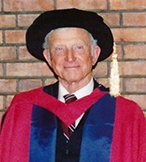

This city we inhabit, Mr Pro-Chancellor, defines us and yet defies definition. Like all great cities, its truths are complex, its relations diverse. Cities, in Italo Calvino's words, are "like dreams...made of desires and fears, even if the thread of their discourse is secret, their rules are absurd, their perspectives deceitful, and everything conceals something else".
Unravelling the mysteries of pre-modern Chinese cities is an abiding preoccupation of Professor William Skinner's distinguished career. In books such as The City in Late Imperial China, and The Chinese City Between Two Worlds, he has brilliantly illuminated the social geography of Imperial China. Recognised internationally as an authority on regional analysis, demographic anthropology, comparative family systems, and agrarian societies, Professor Skinner has demonstrated the extraordinary harmony between social, political, economic and geographical orders. Author and editor of numerous works, he has assembled a dazzling bridge between Sinology and the Social Sciences.
William Skinner's career began at Cornell University in 1947 when he obtained his first degree with distinction in Far Eastern Studies. In 1954, he received a PhD in anthropology from Cornell. In 1958 he taught at Columbia University before moving back to his alma mater where, in 1962 he was appointed professor of Anthropology. In 1965 he became professor of Anthropology at Stanford University. And in 1990 he was appointed to his present position, the chair of Anthropology at the University of California, Davis. He has been visiting professor at numerous universities, including Duke, Pennsylvania, and Keio in Tokyo. Professor Skinner is a former Guggenheim fellow, a fellow of the Center for Advanced Study in the Behavioral Sciences, a member of the National Academy of Sciences, and President of the Association for Asian Studies.
His research into Chinese society began somewhat unpropitiously. In 1949, a year not without significance on the Mainland, he conducted a study of a market town in Sichuan. Some six months into the project, his field notes, photographs, and other important data were confiscated by the authorities, and he was restricted to the city of Chengdu. Despite this setback, he counts this experience as a positive one, partly because his enforced stay in that most traditional city in China, generated his interest in urban studies, to which he has made so huge a contribution, and partly because, his Mainland project thwarted, he began a five-year analysis of the overseas Chinese of Southeast Asia, which is of no less academic importance. He spent three years conducting fieldwork in Thailand, and two years in Indonesia. He has pursued field research also in Japan on historical ethnography and the demography of the Nobi region, and of Ogaki and its rural hinterland.
In the 1960s, Professor Skinner returned his attention to China. Among other things, he developed a comprehensive analysis of market towns in the late Qing Period. His analysis embodies a systematic interpretation of core - periphery relationships between commercial centres and their surrounding hinterlands, as well as a rigorous examination of surface transport routes and intervening natural obstacles. His model of the traditional Chinese marketplace system is still widely employed by cultural anthropologists.
The sweep of this enterprise is wider than might first appear. It offers a holistic exposition of the total society that integrates and transcends discrete accounts of urban-rural systems, stratification and mobility, institutions and social change. He depicts the social geography of imperial China as an intersection of two sets of central-place hierarchies. The first emerged from economic transactions, generating market towns and cities of increasing size and complexity. The second, largely imposed by imperial power, consisted of a hierarchy of administrative jurisdictions. In the former, Skinner discerned the logic of production and distribution. The latter manifests the spatial logic of coercion and extraction. One reviewer of The City in Late Imperial China declared that this remarkable book "should prompt students of imperial China to toss everything else aside until they can absorb and come to grips with [Skinner's] approach".
Professor Skinner's three-volume bibliography Modern Chinese Society is a celebrated vade mecum for scholars of sociology, human geography, history, and economics. It includes 31,000 items in Chinee, Japanese, and various Western languages, and has justly been described as a comprehensive and indispensable work of scholarship.
His creative, groundbreaking advances in cultural anthropology, and his systematic interpretation of the urban environment in all its intricate complexity spawn enduring insights into our changing world, and how we apprehend it. For these signal achievements, I commend Professor G William Skinner to you, Mr Pro-Chancellor, for the award of Doctor of Laws, honoris causa.
Citation written and delivered by Professor Raymond Ivor Wacks, the Public Orator.



